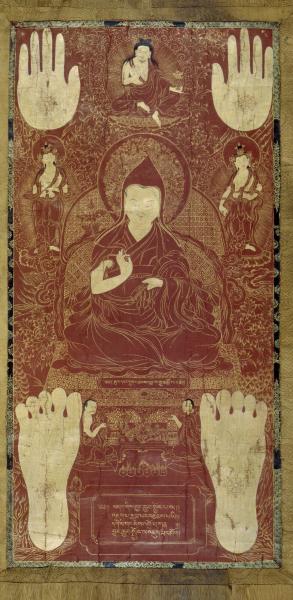The Premodern Colloquium. The White Crane of Alagśa: Lost Lives of the Sixth Dalai Lama in Mongolia
Sangseraima Ujeed, U-M Asian Languages and Cultures

Sunday, October 22, 2023
4:00-6:00 PM
Virtual
The Sixth Dalai Lama Tsangyang Gyatso (1683-1706/46) was recognized in secrecy, lived in controversy, and passed out of history in mystery. The popular tradition holds that he died whilst travelling to Beijing. Yet in some parts of Mongolia, it is believed that the exiled Sixth Dalai Lama escaped his captors and lived out his life in the Gobi desert region of Alagśa, Inner Mongolia. To this day, the figure of the Sixth Dalai Lama still serves as a central pillar of Alagśan identity, Buddhist faith, and cultural pride among the local Mongolian population.
Based on new materials in the form of oral histories, local legends, folk songs, poems, and textual sources that I collected about the Sixth Dalai Lama in Alagśa during a research trip in 2019, this paper will explore the formation of religio-cultural identity and the invention of tradition in the Alagśa since the early eighteenth century. These developments centered the Sixth Dalai Lama, and the narratives are often based on local understandings of the earlier interfaces between the Mongols and the successive incarnations of the Dalai Lama and their regents. This is not a paper that tries to solve the mystery of Tsangyang Gyatso’s death, but rather, one that explores the role he played for the Alagśa Mongols in creating authentic narratives of identity and archetypes of sacredness. This is a story of how Tsangyang Gyatso, his identities, and his interpersonal relationships were reborn in Alagśa and went on to transcend multiple lifetimes and traverse the geopolitical spheres of the cosmopolitan Buddhist world that spanned the Himalayas, Inner Asia, and the Qing.
You can email telf@umich.edu for a registration link.
Based on new materials in the form of oral histories, local legends, folk songs, poems, and textual sources that I collected about the Sixth Dalai Lama in Alagśa during a research trip in 2019, this paper will explore the formation of religio-cultural identity and the invention of tradition in the Alagśa since the early eighteenth century. These developments centered the Sixth Dalai Lama, and the narratives are often based on local understandings of the earlier interfaces between the Mongols and the successive incarnations of the Dalai Lama and their regents. This is not a paper that tries to solve the mystery of Tsangyang Gyatso’s death, but rather, one that explores the role he played for the Alagśa Mongols in creating authentic narratives of identity and archetypes of sacredness. This is a story of how Tsangyang Gyatso, his identities, and his interpersonal relationships were reborn in Alagśa and went on to transcend multiple lifetimes and traverse the geopolitical spheres of the cosmopolitan Buddhist world that spanned the Himalayas, Inner Asia, and the Qing.
You can email telf@umich.edu for a registration link.
| Building: | Off Campus Location |
|---|---|
| Location: | Virtual |
| Event Type: | Workshop / Seminar |
| Tags: | Asia, Buddhism, History, Religion |
| Source: | Happening @ Michigan from Medieval and Early Modern Studies (MEMS), Asian Languages and Cultures |

